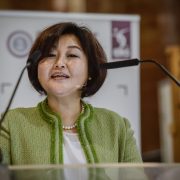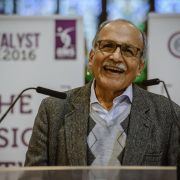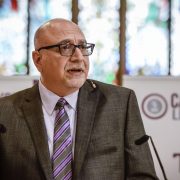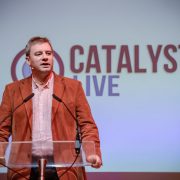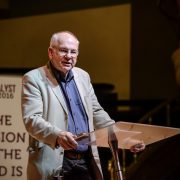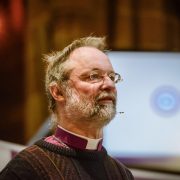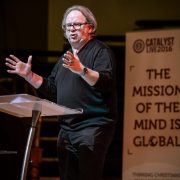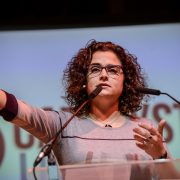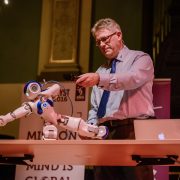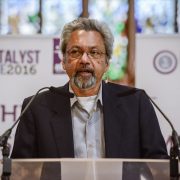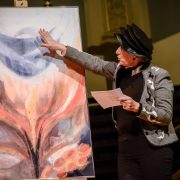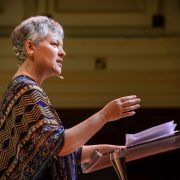“How then shall we live?” That was the question posed by BMS World Mission General Director David Kerrigan, opening Catalyst Live 2016 in Birmingham and Reading this week. “Each generation needs to address the question,” he said in an introduction that took in Leslie Newbiggin, Francis Schaeffer and William Carey.
The question was partly answered by all 13 Catalyst Live speakers in diverse ways, as they addressed many of the challenges facing Christians and society today, both in the UK and worldwide.
God works through migration, argued global diaspora theologian Miyon Chung from Korea/USA. Using biblical examples, like the Jews in exile from Israel in the Old Testament, she argued that God calls refugees to “bloom where they are planted,” and offered a hopeful vision of how people movements can be used by God.
Legendary Latin American theologian Samuel Escobar explored the changes in global mission and echoed Miyon Chung’s assessment of how God is using those on the move. “Many immigrants who have come to Europe are contributing to the life of the Church in significant ways,” he said, pointing out that God’s call to Abraham was to become a migrant.
Fear in the world has affected the Church, something Lebanese leadership expert Elie Haddad found “alarming”. He argued that Christians should look outwards and shared how the refugee crisis has challenged churches to do so in Lebanon. “Abundant life is when we are out there engaged in the mission of God,” he said. Haddad also offered an exciting vision of what Christianity could become in relation to other faith contexts, in a challenging exciting talk.
The word, with, has extra meaning for those who attended Catalyst Live in Reading, thanks to an inspiring talk by London-based vicar and author Sam Wells. Using the story of The English Patient as an illustration, he said “being with” people is more important than doing things for them if we are to overcome the biggest challenge of our time: isolation.
Baptist identity today was analysed by Principal Emeritus of Spurgeon’s College London Nigel Wright, something that is under question in a post-denominational world. “Only when a movement has lost momentum does it obsess over what it is,” he said. Dr Wright affirmed the mutual coexistence of the evangelical and liberal dimensions of being a Baptist.
The Church in the UK is in decline and we should accept this fact, said Bishop of Buckingham Alan Wilson. He suggested that searching where God was moving in our communities was the key to church growth, saying: “Where is Jesus? Find the fire. He is in front of us on the streets.”
Northern Irish poet, music critic and Presbyterian minister Steve Stockman picked up on Alan Wilson’s theme. He shared from his personal experience of peacemaking in Northern Ireland, including speaking at a Sinn Fein conference. “If we are going to be where the fire is, it is going to get messy,” he concluded.
Shadia Qubti is a peacemaker in Israel-Palestine, trying to bring Israelis and Palestinians closer together. She admitted to an occasional sense of hopelessness with the situation there, but also her determination not to give up. “Peacemaking is a way of life and you need to make the most of every opportunity that comes your way,” she recommended.
English Robotics expert Nigel Crook explored the morality of robots with the help of his mechanical friend Wendy. He argued that, as artificial intelligence advances, the growing autonomy of robots will need to have a moral dimension, saying: “Robots will need to develop a moral character of some form. A robot cannot develop moral competence within a moral vacuum.”
Sri Lankan theologian Vinoth Ramachandra warned against the kind of technological advancement that diminishes us, citing a US study showing a 40 per cent decline in empathy among teenagers who are always online. “Connectedness replaces intimacy,” he argued. “We need to create spaces in our lives and our workspaces for those non-technology-led conversations and moments of solitude where our spirituality is nurtured.”
Dutch Christian artist Anneke Kaai shared the inspiration behind her paintings and her conviction to show to others that “God is not dead”. She also argued that the Church could use art more in sharing the gospel. “Does the Church need art? If we have a message, it needs to be communicated in a language that people can understand,” she said. Art has “the power to touch the heart. It is an excellent conversation starter.”
Creativity was the theme of English Baptist minister and ethnomusicologist Margaret Gibbs’ talk, where she argued that worship music has become unhealthily monetised, thanks in part to copyright and song licensing, something which is not always good for the Church. “Worship becomes a commodity, becomes a commercial venture, the opposite of the sacrifice of praise,” she said. “We’ve created licences to worship instead of the freedom to do so.”
As ever, those who attended Catalyst Live found it challenging and helpful. Trevor Neill said on Twitter: “Thanks to BMS for gift of Catalyst Live 2016, thinking that stretches and inspiring speakers.”
Craig Gardiner tweeted: “Loved Catalyst Live with BMS World Mission today. Such a rich cornucopia of food for the brain, heart and soul.”
Catalyst Live 2016 host Mark Woods in his closing comments agreed, calling it a “fantastic, hard thinking day”. “We have all benefited from this,” he said.
Go to the Catalyst Live video/audio section from 21 November to watch this year’s talks.

